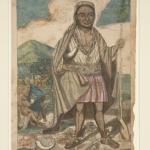Voice in the Wind, pp. 381-387
Atretes has arrived in Ephesus. His new owner, Sertes, tells him all about the magnificent temple of Artemis as they arrive. Sertes assumes Atretes is a devote of Artemis, since he had a statue of her in his cell at the ludus. Atretes pretends not to be interested and says the idol was there when he got there. Still, he wonders to himself whether Artemis is related to Tiwaz, his god in Germany, as they seem to have similar characteristics. Atretes asks Sertes if he can go to the temple, and Sertes takes him; while there, Atretes notices something:
Suddenly he drew in his breath—the symbol crowning Artemis’ headpiece was the rune for Tiwaz! With a hoarse cry, Atretes prostrated himself before the image of Artemis and gave thanks to her for her protection through four years of bloody games.
I’m having trouble making sense of this. The rune of Tiwaz, it appears, was an arrow pointing upwards. The statues I’m finding under “Artemis of the Ephesians” all look about like this:

I’m not seeing an arrow pointing upward anywhere. Sertes mentions the Ephesian Letters and asks Atretes which has special meaning to him; Atretes points to one and Sertes says he can buy a charm bearing it, as the letters have special powers. I tried looking up the Ephesian Letters but am at a loss as to which Greek character could possibly look like an arrow pointing upwards.
If any of you have some idea or can solve this mystery, I’d be interested to hear what you find! Perhaps crowdsourcing it will turn something up!
Of course, whether Rivers got her facts right, here, isn’t that important to the story. The main takeaway in this rather boring section appears to be that Atretes now worships Artemis. After prostrating himself, Atretes selects a temple prostitute and goes off with her to a brothel. Rivers tells us he’s become so accustomed to being treated as a brute that he doesn’t give it a second thought.
I’ve been given to understand, by the way, that the evidence for cult prostitution in Ephesus is iffy, so this whole temple prostitute storyline (and trust me, this is not the end of it) may be engagement in myth.
Now we turn to Hadassah and Julia. The family’s new house in Ephesus has too many erotic frescos on the walls for Hadassah’s comfort. Decimus begins feeling better once in Ephesus, however. Julia wanted to know where the best jewelry and cloth shops were, so she sent Hadassah out to explore the city.
As Hadassah walked along the marble-paved streets, she passed one lane after another, all dedicated to one god or another. She saw baths, public buildings, a medical school, a library. She turned ac order, and there ahead of her, on a street lined by idol venders, loomed the Artemision. Despite its amazing beauty, Hadassah felt her spirit recoil.
Yet, curious, she approached and sat in a shady portico to watch people mill about the temple. Many who passed her carried small shrines and idols they had purchased. Hadassah shook her head in disbelief. Hundreds of people were going up and down the steps to worship a stone idol that was without life or power.
The young Jewess felt an aching sadness and loneliness. She looked up at the beauty and immensity of the Artemesion and felt small and helpless by comparison. She looked at the hundreds of worshipers and was afraid. Rome had been frightening enough, but something about Ephesus oppressed her spirit.
As I’ve mentioned before, I’m unclear on why Rivers views Ephesus as so much worse than Rome. But so it is.
Still out on the streets, Hadassah closes her eyes to pray: “I feel so alone. Help me find friends like Asyncritus and Trophimus and the others.” When she opens them she scans the crowd and, to her complete surprise and joy, sees the Apostle John. Yep, she’s definitely going to interpret that as an answered prayer. She ran to him and he opened his arms and they laughed and cried together. John had been a family friend, remember, when she was growing up in Galilee. Hadassah is overwhelmed with happiness and feels more at home since she has since she left Galilee.
The scene changes again, and we’re with Marcus. He’s brooding. Surprise!
A maid was at work scrubbing the tiles of the mosaic depicting a satyr in pursuit of a naked maiden. The girl looked up at him and smiled. She was new to the household, one of his father’s purchases upon their arrival. Marcus suspected his father had bought the girl in hopes that her dusky beauty and full curves would distract him from his obsession with Hadassah.
His father might well have saved his money.
I’m not sure whether Rivers realizes this, but this book is beginning to read something like a horror story. Or a true crime story, perhaps? Marcus isn’t handsome and dashing, he’s downright frightening.
Straightening, Marcus went back tiny his chamber to pour himself some wine. Taking a drink, he went out onto the terrace, looking below at the people thronging the street. With an uncanny sense of swift recognition, Marcus saw Hadassah weaving her way up Kuretes Street. Her hair was covered with the striped shawl she habitually wore, and she carried a basket of peaches and grapes on her hip—fruit to satisfy Julia’s whim while his own needs went unanswered.
See what I mean!? Run, Hadassah, run!
I would go on, but the next bit is lengthy and self-contained, so I’ll stop here. But I can’t help but thinking what another author might do with this. Perhaps there is something dark in Ephesus, and it’s affecting Marcus. Perhaps it takes hold of him, maybe even possesses him. Or perhaps it is simply a true crime story, and Marcus ends up murdering Hadassah. What other genres could we throw in here?
One thing I appreciated about the comment sections on my review of Anonymous Tip was the rewrites that posited, say, that Casey was a figment of Gwen’s imagination. What could we do with the various recent turns in Voice in the Wind?
Next week you’ll see why I’m calling it here. All the trigger warnings.















